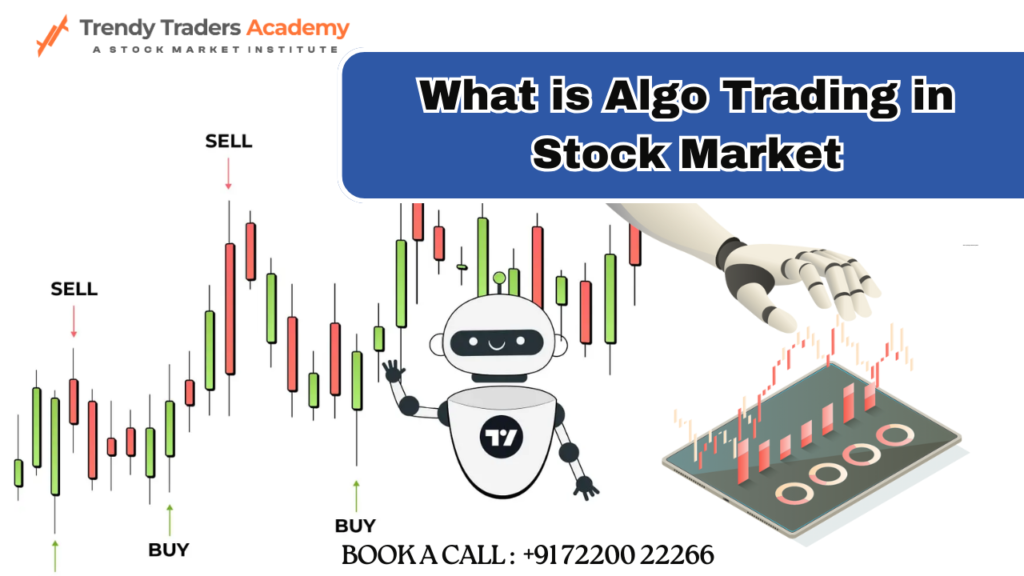What is Algo Trading? A Complete Guide
Introduction
Have you ever wondered how big financial firms make trades in milliseconds? That’s the power of algorithmic trading (algo trading). Instead of humans placing trades manually, computers execute them automatically based on predefined rules. But is algo trading profitable? And how does it work?
Discover what is algo trading and is algo trading profitable. Learn how algorithmic trading works, its benefits, risks, and whether it’s right for you.
What is Algo Trading?
Algorithmic trading, or algo trading, is the use of computer programs to execute trades automatically. These programs follow a set of pre-defined instructions, such as timing, price, quantity, or even complex mathematical models.
How Does Algo Trading Work?
Algo trading uses automated trading software that follows programmed rules. It analyzes market data, identifies trading opportunities, and executes trades within milliseconds, eliminating emotional decision-making.
Types of Algorithmic Trading Strategies
Momentum Trading
Traders buy assets when prices are rising and sell when they start falling.
Mean Reversion
This strategy assumes that asset prices will return to their historical average over time.
Arbitrage
Buying an asset in one market and selling it in another for a risk-free profit.
Market Making
Placing buy and sell orders simultaneously to profit from bid-ask spreads.
Benefits of Algo Trading
- Speed: Trades are executed within milliseconds.
- Efficiency: Eliminates human errors.
- Backtesting: Strategies can be tested on historical data.
- Reduced Costs: No need for manual supervision.
Risks and Challenges in Algo Trading
- Technical Failures: Software glitches can cause massive losses.
- Market Volatility: Algorithms can amplify market crashes.
- Regulatory Issues: Compliance with trading laws is essential.
Is Algo Trading Profitable?
Yes, but profitability depends on strategy, execution, and market conditions. Institutional traders often profit, but retail traders need deep knowledge and capital.
Who Uses Algo Trading?
- Hedge Funds: Use high-frequency strategies.
- Investment Banks: Execute large orders efficiently.
- Retail Traders: Automate trades for better efficiency.
Algo Trading vs. Manual Trading
| Factor | Algo Trading | Manual Trading |
| Speed | Instantaneous | Slow |
| Emotion | None | Affected by emotions |
| Efficiency | High | Lower |
| Complexity | High | Lower |
How to Get Started with Algo Trading?
- Learn programming languages like Python or C++.
- Choose a reliable trading platform.
- Develop and test strategies before deploying live.
Best Algo Trading Software and Platforms
- MetaTrader 4 & 5
- NinjaTrader
- Interactive Brokers
- QuantConnect
The Role of AI and Machine Learning in Algo Trading
AI enhances algo trading by predicting trends, analyzing massive datasets, and executing trades with higher accuracy.
Regulations and Legal Aspects of Algo Trading
Regulatory bodies like the SEC (USA) and SEBI (India) monitor algo trading to prevent manipulation and maintain market stability.
Future of Algo Trading
Expect more AI integration, stricter regulations, and increased retail adoption.
Common Myths About Algo Trading
- “It guarante.” – Not true; strategies must be well-designed.
- “Only big firms can do it.” – Retail traders can participate too.
- “It’s risk-free.” – Technical issues and market conditions can impact results.
Final Thoughts
Algo trading is a powerful tool, but it requires knowledge, strategy, and discipline. While it can be profitable, it’s not a get-rich-quick scheme. Understanding the risks and benefits is key to success.
FAQs
Can beginners start algo trading?
Yes, but they should first learn coding and trading basics before diving in.
How much capital is needed for algo trading?
It depends on the strategy; some require thousands, while others can start small.
Do you need to know programming for algo trading?
Not always, but programming skills help in customizing strategies.
Is algo trading legal?
Yes, but traders must comply with regulatory guidelines in their country.
Can retail traders compete with institutional algo traders?
It’s challenging but possible with the right strategies and tools.



